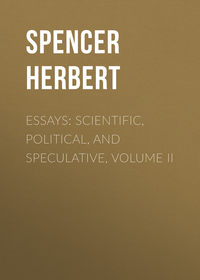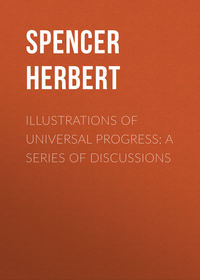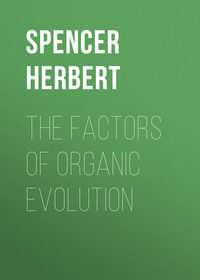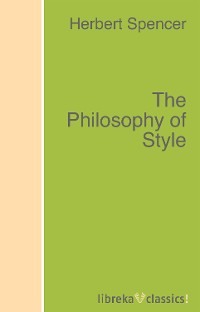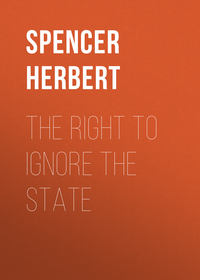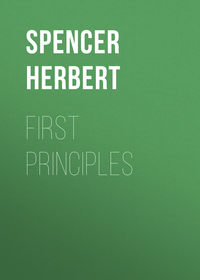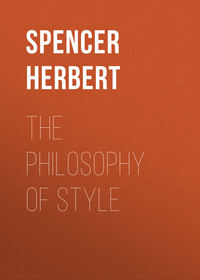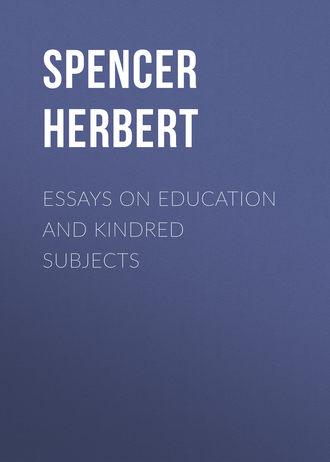 полная версия
полная версияEssays on Education and Kindred Subjects
But now mark that while, for the training of mere memory, science is as good as, if not better than, language; it has an immense superiority in the kind of memory it trains. In the acquirement of a language, the connections of ideas to be established in the mind correspond to facts that are in great measure accidental; whereas, in the acquirement of science, the connections of ideas to be established in the mind correspond to facts that are mostly necessary. It is true that the relations of words to their meanings are in one sense natural; that the genesis of these relations may be traced back a certain distance, though rarely to the beginning; and that the laws of this genesis form a branch of mental science – the science of philology. But since it will not be contended that in the acquisition of languages, as ordinarily carried on, these natural relations between words and their meanings are habitually traced, and their laws explained; it must be admitted that they are commonly learned as fortuitous relations. On the other hand, the relations which science presents are causal relations; and, when properly taught, are understood as such. While language familiarises with non-rational relations, science familiarises with rational relations. While the one exercises memory only, the other exercises both memory and understanding.
Observe next, that a great superiority of science over language as a means of discipline, is, that it cultivates the judgment. As, in a lecture on mental education delivered at the Royal Institution, Professor Faraday well remarks, the most common intellectual fault is deficiency of judgment. "Society, speaking generally," he says, "is not only ignorant as respects education of the judgment, but it is also ignorant of its ignorance." And the cause to which he ascribes this state, is want of scientific culture. The truth of his conclusion is obvious. Correct judgment with regard to surrounding objects, events, and consequences, becomes possible only through knowledge of the way in which surrounding phenomena depend on each other. No extent of acquaintance with the meanings of words, will guarantee correct inferences respecting causes and effects. The habit of drawing conclusions from data, and then of verifying those conclusions by observation and experiment, can alone give the power of judging correctly. And that it necessitates this habit is one of the immense advantages of science.
Not only, however, for intellectual discipline is science the best; but also for moral discipline. The learning of languages tends, if anything, further to increase the already undue respect for authority. Such and such are the meanings of these words, says the teacher of the dictionary. So and so is the rule in this case, says the grammar. By the pupil these dicta are received as unquestionable. His constant attitude of mind is that of submission to dogmatic teaching. And a necessary result is a tendency to accept without inquiry whatever is established. Quite opposite is the mental tone generated by the cultivation of science. Science makes constant appeal to individual reason. Its truths are not accepted on authority alone; but all are at liberty to test them – nay, in many cases, the pupil is required to think out his own conclusions. Every step in a scientific investigation is submitted to his judgment. He is not asked to admit it without seeing it to be true. And the trust in his own powers thus produced is further increased by the uniformity with which Nature justifies his inferences when they are correctly drawn. From all which there flows that independence which is a most valuable element in character. Nor is this the only moral benefit bequeathed by scientific culture. When carried on, as it should always be, as much as possible under the form of original research, it exercises perseverance and sincerity. As says Professor Tyndall of inductive inquiry, "It requires patient industry, and an humble and conscientious acceptance of what Nature reveals. The first condition of success is an honest receptivity and a willingness to abandon all preconceived notions, however cherished, if they be found to contradict the truth. Believe me, a self-renunciation which has something noble in it, and of which the world never hears, is often enacted in the private experience of the true votary of science."
Lastly we have to assert – and the assertion will, we doubt not, cause extreme surprise – that the discipline of science is superior to that of our ordinary education, because of the religious culture that it gives. Of course we do not here use the words scientific and religious in their ordinary limited acceptations; but in their widest and highest acceptations. Doubtless, to the superstitions that pass under the name of religion, science is antagonistic; but not to the essential religion which these superstitions merely hide. Doubtless, too, in much of the science that is current, there is a pervading spirit of irreligion; but not in that true science which had passed beyond the superficial into the profound.
"True science and true religion," says Professor Huxley at the close of a recent course of lectures, "are twin-sisters, and the separation of either from the other is sure to prove the death of both. Science prospers exactly in proportion as it is religious; and religion flourishes in exact proportion to the scientific depth and firmness of its basis. The great deeds of philosophers have been less the fruit of their intellect than of the direction of that intellect by an eminently religious tone of mind. Truth has yielded herself rather to their patience, their love, their single-heartedness, and their self-denial, than to their logical acumen."
So far from science being irreligious, as many think, it is the neglect of science that is irreligious – it is the refusal to study the surrounding creation that is irreligious. Take a humble simile. Suppose a writer were daily saluted with praises couched in superlative language. Suppose the wisdom, the grandeur, the beauty of his works, were the constant topics of the eulogies addressed to him. Suppose those who unceasingly uttered these eulogies on his works were content with looking at the outsides of them; and had never opened them, much less tried to understand them. What value should we put upon their praises? What should we think of their sincerity? Yet, comparing small things to great, such is the conduct of mankind in general, in reference to the Universe and its Cause. Nay, it is worse. Not only do they pass by without study, these things which they daily proclaim to be so wonderful; but very frequently they condemn as mere triflers those who give time to the observation of Nature – they actually scorn those who show any active interest in these marvels. We repeat, then, that not science, but the neglect of science, is irreligious. Devotion to science, is a tacit worship – a tacit recognition of worth in the things studied; and by implication in their Cause. It is not a mere lip-homage, but a homage expressed in actions – not a mere professed respect, but a respect proved by the sacrifice of time, thought, and labour.
Nor is it thus only that true science is essentially religious. It is religious, too, inasmuch as it generates a profound respect for, and an implicit faith in, those uniformities of action which all things disclose. By accumulated experiences the man of science acquires a thorough belief in the unchanging relations of phenomena – in the invariable connection of cause and consequence – in the necessity of good or evil results. Instead of the rewards and punishments of traditional belief, which people vaguely hope they may gain, or escape, spite of their disobedience; he finds that there are rewards and punishments in the ordained constitution of things; and that the evil results of disobedience are inevitable. He sees that the laws to which we must submit are both inexorable and beneficent. He sees that in conforming to them, the process of things is ever towards a greater perfection and a higher happiness. Hence he is led constantly to insist on them, and is indignant when they are disregarded. And thus does he, by asserting the eternal principles of things and the necessity of obeying them, prove himself intrinsically religious.
Add lastly the further religious aspect of science, that it alone can give us true conceptions of ourselves and our relation to the mysteries of existence. At the same time that it shows us all which can be known, it shows us the limits beyond which we can know nothing. Not by dogmatic assertion, does it teach the impossibility of comprehending the Ultimate Cause of things; but it leads us clearly to recognise this impossibility by bringing us in every direction to boundaries we cannot cross. It realises to us in a way which nothing else can, the littleness of human intelligence in the face of that which transcends human intelligence. While towards the traditions and authorities of men its attitude may be proud, before the impenetrable veil which hides the Absolute its attitude is humble – a true pride and a true humility. Only the sincere man of science (and by this title we do not mean the mere calculator of distances, or analyser of compounds, or labeller of species; but him who through lower truths seeks higher, and eventually the highest) – only the genuine man of science, we say, can truly know how utterly beyond, not only human knowledge but human conception, is the Universal Power of which Nature, and Life, and Thought are manifestations.
We conclude, then, that for discipline, as well as for guidance, science is of chiefest value. In all its effects, learning the meanings of things, is better than learning the meanings of words. Whether for intellectual, moral, or religious training, the study of surrounding phenomena is immensely superior to the study of grammars and lexicons.
Thus to the question we set out with – What knowledge is of most worth? – the uniform reply is – Science. This is the verdict on all the counts. For direct self-preservation, or the maintenance of life and health, the all-important knowledge is – Science. For that indirect self-preservation which we call gaining a livelihood, the knowledge of greatest value is – Science. For the due discharge of parental functions, the proper guidance is to be found only in – Science. For that interpretation of national life, past and present, without which the citizen cannot rightly regulate his conduct, the indispensable key is – Science. Alike for the most perfect production and highest enjoyment of art in all its forms, the needful preparation is still – Science. And for purposes of discipline – intellectual, moral, religious – the most efficient study is, once more – Science. The question which at first seemed so perplexed, has become, in the course of our inquiry, comparatively simple. We have not to estimate the degrees of importance of different orders of human activity, and different studies as severally fitting us for them; since we find that the study of Science, in its most comprehensive meaning, is the best preparation for all these orders of activity. We have not to decide between the claims of knowledge of great though conventional value, and knowledge of less though intrinsic value; seeing that the knowledge which proves to be of most value in all other respects, is intrinsically most valuable: its worth is not dependent upon opinion, but is as fixed as is the relation of man to the surrounding world. Necessary and eternal as are its truths, all Science concerns all mankind for all time. Equally at present and in the remotest future, must it be of incalculable importance for the regulation of their conduct, that men should understand the science of life, physical, mental, and social; and that they should understand all other science as a key to the science of life.
And yet this study, immensely transcending all other in importance, is that which, in an age of boasted education, receives the least attention. While what we call civilisation could never have arisen had it not been for science, science forms scarcely an appreciable element in our so-called civilised training. Though to the progress of science we owe it, that millions find support where once there was food only for thousands; yet of these millions but a few thousands pay any respect to that which has made their existence possible. Though increasing knowledge of the properties and relations of things has not only enabled wandering tribes to grow into populous nations, but has given to the countless members of these populous nations, comforts and pleasures which their few naked ancestors never even conceived, or could have believed, yet is this kind of knowledge only now receiving a grudging recognition in our highest educational institutions. To the slowly growing acquaintance with the uniform co-existences and sequences of phenomena – to the establishment of invariable laws, we owe our emancipation from the grossest superstitions. But for science we should be still worshipping fetishes; or, with hecatombs of victims, propitiating diabolical deities. And yet this science, which, in place of the most degrading conceptions of things, has given us some insight into the grandeurs of creation, is written against in our theologies and frowned upon from our pulpits.
Paraphrasing an Eastern fable, we may say that in the family of knowledges, Science is the household drudge, who, in obscurity, hides unrecognised perfections. To her has been committed all the works; by her skill, intelligence, and devotion, have all conveniences and gratifications been obtained; and while ceaselessly ministering to the rest, she has been kept in the background, that her haughty sisters might flaunt their fripperies in the eyes of the world. The parallel holds yet further. For we are fast coming to the dénouement, when the positions will be changed; and while these haughty sisters sink into merited neglect, Science, proclaimed as highest alike in worth and beauty, will reign supreme.
INTELLECTUAL EDUCATION
There cannot fail to be a relationship between the successive systems of education, and the successive social states with which they have co-existed. Having a common origin in the national mind, the institutions of each epoch, whatever be their special functions, must have a family likeness. When men received their creed and its interpretations from an infallible authority deigning no explanations, it was natural that the teaching of children should be purely dogmatic. While "believe and ask no questions" was the maxim of the Church, it was fitly the maxim of the school. Conversely, now that Protestantism has gained for adults a right of private judgment and established the practice of appealing to reason, there is harmony in the change that has made juvenile instruction a process of exposition addressed to the understanding. Along with political despotism, stern in its commands, ruling by force of terror, visiting trifling crimes with death, and implacable in its vengeance on the disloyal, there necessarily grew up an academic discipline similarly harsh – a discipline of multiplied injunctions and blows for every breach of them – a discipline of unlimited autocracy upheld by rods, and ferules, and the black-hole. On the other hand, the increase of political liberty, the abolition of laws restricting individual action, and the amelioration of the criminal code, have been accompanied by a kindred progress towards non-coercive education: the pupil is hampered by fewer restraints, and other means than punishments are used to govern him. In those ascetic days when men, acting on the greatest-misery principle, held that the more gratifications they denied themselves the more virtuous they were, they, as a matter of course, considered that the best education which most thwarted the wishes of their children, and cut short all spontaneous activity with – "You mustn't do so." While, on the contrary, now that happiness is coming to be regarded as a legitimate aim – now that hours of labour are being shortened and popular recreations provided – parents and teachers are beginning to see that most childish desires may rightly be gratified, that childish sports should be encouraged, and that the tendencies of the growing mind are not altogether so diabolical as was supposed. The age in which all believed that trades must be established by bounties and prohibitions; that manufacturers needed their materials and qualities and prices to be prescribed; and that the value of money could be determined by law; was an age which unavoidably cherished the notions that a child's mind could be made to order; that its powers were to be imparted by the schoolmaster; that it was a receptacle into which knowledge was to be put, and there built up after the teacher's ideal. In this free-trade era, however, when we are learning that there is much more self-regulation in things than was supposed; that labour, and commerce, and agriculture, and navigation, can do better without management than with it; that political governments, to be efficient, must grow up from within and not be imposed from without; we are also being taught that there is a natural process of mental evolution which is not to be disturbed without injury; that we may not force on the unfolding mind our artificial forms; but that psychology, also, discloses to us a law of supply and demand to which, if we would not do harm, we must conform. Thus, alike in its oracular dogmatism, in its harsh discipline, in its multiplied restrictions, in its professed asceticism, and in its faith in the devices of men, the old educational regime was akin to the social systems with which it was contemporaneous; and similarly, in the reverse of these characteristics, our modern modes of culture correspond to our more liberal religious and political institutions.
But there remain further parallelisms to which we have not yet adverted: that, namely, between the processes by which these respective changes have been wrought out; and that between the several states of heterogeneous opinion to which they have led. Some centuries ago there was uniformity of belief – religious, political, and educational. All men were Romanists, all were Monarchists, all were disciples of Aristotle; and no one thought of calling in question that grammar-school routine under which all were brought up. The same agency has in each case replaced this uniformity by a constantly-increasing diversity. That tendency towards assertion of the individuality, which, after contributing to produce the great Protestant movement, has since gone on to produce an ever-increasing number of sects – that tendency which initiated political parties, and out of the two primary ones has, in these modern days, evolved a multiplicity to which every year adds – that tendency which led to the Baconian rebellion against the schools, and has since originated here and abroad, sundry new systems of thought – is a tendency which, in education also, has caused divisions and the accumulation of methods. As external consequences of the same internal change, these processes have necessarily been more or less simultaneous. The decline of authority, whether papal, philosophic, kingly, or tutorial, is essentially one phenomenon; in each of its aspects a leaning towards free action is seen alike in the working out of the change itself, and in the new forms of theory and practice to which the change has given birth.
While many will regret this multiplication of schemes of juvenile culture, the catholic observer will discern in it a means of ensuring the final establishment of a rational system. Whatever may be thought of theological dissent, it is clear that dissent in education results in facilitating inquiry by the division in labour. Were we in possession of the true method, divergence from it would, of course, be prejudicial; but the true method having to be found, the efforts of numerous independent seekers carrying out their researches in different directions, constitute a better agency for finding it than any that could be devised. Each of them struck by some new thought which probably contains more or less of basis in facts – each of them zealous on behalf of his plan, fertile in expedients to test its correctness, and untiring in his efforts to make known its success – each of them merciless in his criticism on the rest; there cannot fail, by composition of forces, to be a gradual approximation of all towards the right course. Whatever portion of the normal method any one has discovered, must, by the constant exhibition of its results, force itself into adoption; whatever wrong practices he has joined with it must, by repeated experiment and failure, be exploded. And by this aggregation of truths and elimination of errors, there must eventually be developed a correct and complete body of doctrine. Of the three phases through which human opinion passes – the unanimity of the ignorant, the disagreement of the inquiring, and the unanimity of the wise – it is manifest that the second is the parent of the third. They are not sequences in time only, they are sequences in causation. However impatiently, therefore, we may witness the present conflict of educational systems, and however much we may regret its accompanying evils, we must recognise it as a transition stage needful to be passed through, and beneficent in its ultimate effects.
Meanwhile, may we not advantageously take stock of our progress? After fifty years of discussion, experiment, and comparison of results, may we not expect a few steps towards the goal to be already made good? Some old methods must by this time have fallen out of use; some new ones must have become established; and many others must be in process of general abandonment or adoption. Probably we may see in these various changes, when put side by side, similar characteristics – may find in them a common tendency; and so, by inference, may get a clue to the direction in which experience is leading us, and gather hints how we may achieve yet further improvements. Let us then, as a preliminary to a deeper consideration of the matter, glance at the leading contrasts between the education of the past and that of the present.
The suppression of every error is commonly followed by a temporary ascendency of the contrary one; and so it happened, that after the ages when physical development alone was aimed at, there came an age when culture of the mind was the sole solicitude – when children had lesson-books put before them at between two and three years old, and the getting of knowledge was thought the one thing needful. As, further, it usually happens that after one of these reactions the next advance is achieved by co-ordinating the antagonist errors, and perceiving that they are opposite sides of one truth; so, we are now coming to the conviction that body and mind must both be cared for, and the whole thing being unfolded. The forcing-system has been, by many, given up; and precocity is discouraged. People are beginning to see that the first requisite to success in life, is to be a good animal. The best brain is found of little service, if there be not enough vital energy to work it; and hence to obtain the one by sacrificing the source of the other, is now considered a folly – a folly which the eventual failure of juvenile prodigies constantly illustrates. Thus we are discovering the wisdom of the saying, that one secret in education is "to know how wisely to lose time."
The once universal practice of learning by rote, is daily falling more into discredit. All modern authorities condemn the old mechanical way of teaching the alphabet. The multiplication table is now frequently taught experimentally. In the acquirement of languages, the grammar-school plan is being superseded by plans based on the spontaneous process followed by the child in gaining its mother tongue. Describing the methods there used, the "Reports on the Training School at Battersea" say: – "The instruction in the whole preparatory course is chiefly oral, and is illustrated as much as possible by appeals to nature." And so throughout. The rote-system, like ether systems of its age, made more of the forms and symbols than of the things symbolised. To repeat the words correctly was everything; to understand their meaning nothing; and thus the spirit was sacrificed to the letter. It is at length perceived that, in this case as in others, such a result is not accidental but necessary – that in proportion as there is attention to the signs, there must be inattention to the things signified; or that, as Montaigne long ago said —Sçavoir par cœur n'est pas sçavoir.




